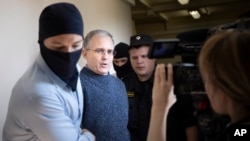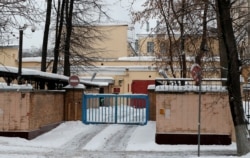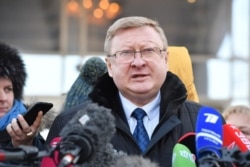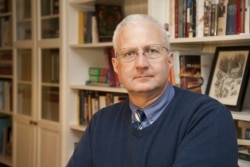This story originated from VOA's Polygraph.info.
A former U.S. Marine being held in a Russian prison on espionage allegations has declined surgery for a chronically painful medical condition.
Paul Whelan, an American businessman who has been jailed in Moscow's Lefortovo prison since December, had been scheduled to have surgery on a preexisting inguinal hernia upon returning to United States earlier this year.
A frequent visitor to Russia, Whelan was detained in central Moscow's Metropol Hotel on Dec. 28 and accused of carrying Russian state secrets on a flash drive given to him by an unnamed person.
The U.S. Embassy in Moscow and Whelan's family have long objected to his detention, insisting that the charges against him are false and that he has been repeatedly denied requests for medical care and communication with family.
Moscow officials have denied for months that Whelan had any medical conditions, but on Aug. 23, an ambulance was called to a Moscow courtroom after Whelan said he had been injured by a prison guard who forced him to move heavy personal belongings to a new cell.
The judge immediately halted courtroom proceedings for a medical evaluation by paramedics before ruling that his pretrial detention should be extended until Oct. 29.
According to Whelan's attorney, Vladimir Zherebenkov, the 49-year-old Michigan native was examined by doctors at Moscow's Hospital #20 on Sept. 6, who confirmed he was suffering from a hernia that required surgery.
"We have been sending requests for a medical examination to the Ministry of Health and others, so he was examined last Friday," Zherebenkov told VOA's Polygraph.info.
"The doctors did not say the hernia was in an acute stage, yet offered surgery, but Paul refused. He doesn't trust the Russian doctors."
Zherebenkov said Whelan has instead chosen to manage the pain with medication provided by prison administrators.
"He's given No-Spa (a brand of antispasmodic drug also known as Doverin) every day for pain," Zherebenkov said.
Whelan's brother, David, told Polygraph.info the hernia is becoming more serious.
"He was scheduled to have surgery in January this year when he returned from Russia, but obviously he has never returned from Russia," he said.
Restricted communication
David Whelan also contradicted Russian officials who have insisted that his brother has been afforded all contacts and communications in accordance with Russian law, which allows detainees at least one phone call a month with their families.
"Paul sought phone call access, but that was denied by FSB investigator Aleksei Khishnyak. We don't think that it would be safe for us to visit Russia while he is in prison, and we have no other way to communicate with him," David Whelan said.
"Because there are no translators at Lefortovo, it is impossible to control what Paul will be talking about with his relatives," Zherebenkov said. "Due to such technical reasons, there has not been a single phone call, and there is no such possibility in the future."
Zherebenkov also said mail correspondence between the detainee and his family travels via special — and especially slow — channels.
"There is a complication with Paul's mail correspondence with the family due to censorship and translation," Zherebenkov said. "There are no translators at Lefortovo, so the warden receives the letters. He then sends them to the FSB investigator, and the investigator sends them to the translator. Then, the entire process repeats in reverse order.
"This takes up to two months," he said.
Zherebenkov also told Polygraph.info that Whelan, who had been held in solitary confinement for at least the first 10 days of his detention, now has a new cellmate — a high-profile Russian businessman who is fluent in English and has been helping Whelan communicate with guards.
Whelan, who holds the citizenships of four nations, including the United States, said he was a "victim of a political kidnapping," and the accusations against him were a "politically motivated sting."
Business visa
Although Whelan was apprehended in Russia while attending a friend's wedding, he was traveling on a business visa supported by his employer, BorgWarner Inc., a U.S. auto parts manufacturer that services trucks and buses made by Russian manufacturers Kamaz and Nefaz. BorgWarner has emphatically denied Whelan was in Russia on business, and yet they've refused to explain why they sponsored his visa for personal travel.
Detroit Free Press correspondents Kristen Jordan Shamus and Deirdre Shesgreen reported in January that although BorgWarner had no facilities in Russia, the Michigan company's business dealings with Russian manufacturers had drawn scrutiny from the U.S. Securities and Exchange Commission. In 2016, SEC officials wrote to BorgWarner, inquiring about its relationship with Kamaz, which remains under U.S. sanctions after the Russian military delivery of Kamaz trucks to Syria and Sudan.
Kamaz CEO Sergei A. Kogogin co-chaired Russian President Vladimir Putin's 2018 re-election campaign.
The United States Embassy in Moscow has demanded that Russian authorities release Whelan from prison, saying the conditions of his detention are inhumane and that he has been deprived of adequate medical help amid deteriorating health and isolation from his family.
Isolation and limited access to medical assistance are part of a Russian government pressure tactic to extract a confession from his brother on "completely bogus charges," David Whelan said.
On Sept. 2, the U.S. Embassy in Moscow posted on Twitter in Russian: "Paul Whelan's parents are celebrating their 59th wedding anniversary today. Paul Whelan hasn't heard their voices in over 8 months. Maybe the Russian government will let Paul call his parents and congratulate them personally? Stop the isolation #PaulWhelan @MID_RF."







